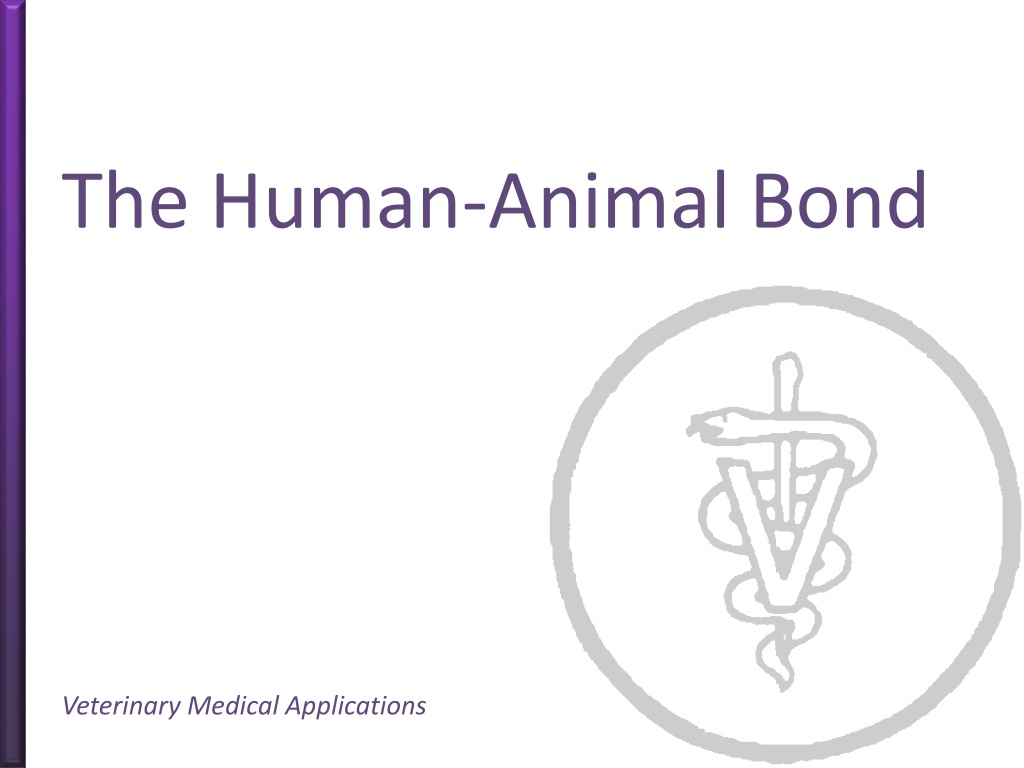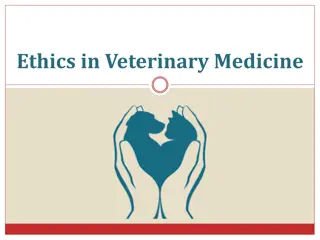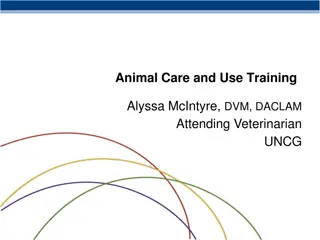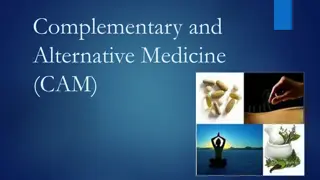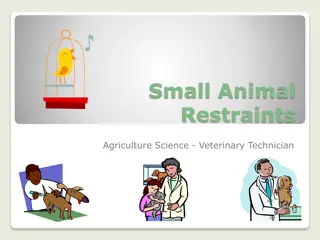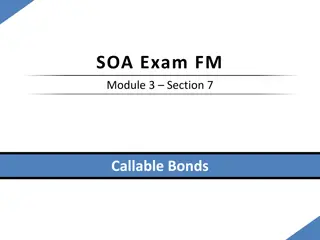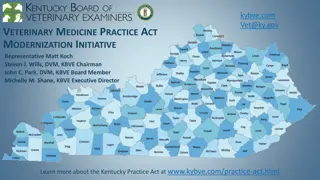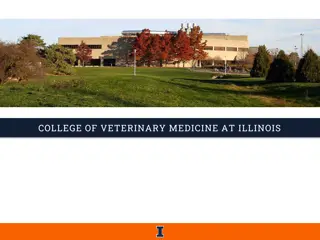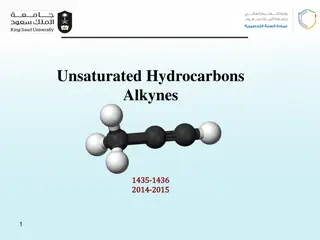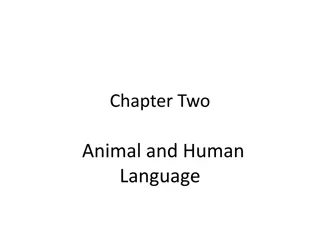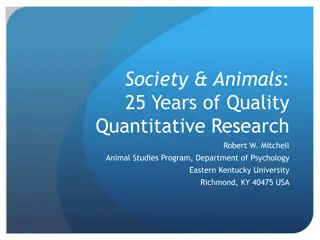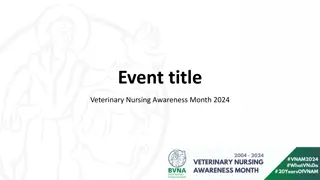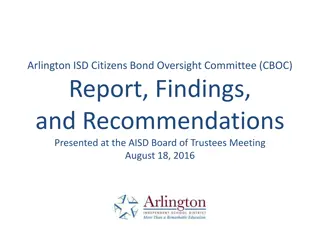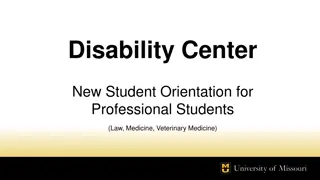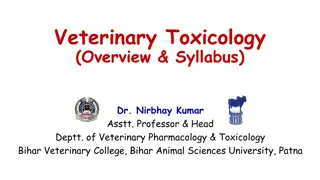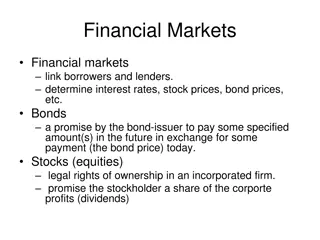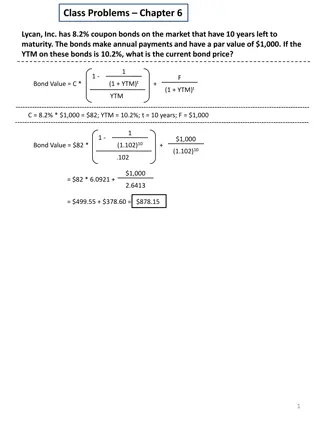Exploring the Human-Animal Bond in Veterinary Medicine
Delve into the significance of the human-animal bond in veterinary medicine, highlighting the mutually beneficial relationship between animals and humans over time. Understand how this bond has evolved, the role of veterinary assistants in fostering this connection, and the changing dynamics of human-animal relationships in modern society.
Download Presentation

Please find below an Image/Link to download the presentation.
The content on the website is provided AS IS for your information and personal use only. It may not be sold, licensed, or shared on other websites without obtaining consent from the author. Download presentation by click this link. If you encounter any issues during the download, it is possible that the publisher has removed the file from their server.
E N D
Presentation Transcript
The Human-Animal Bond Veterinary Medical Applications
What is The Human-Animal Bond? What is the relationship between animals and humans? What does this mean to you? How is it important to a veterinarian?
What is The Human-Animal Bond? The mutually beneficial relationship between people and animals that is influenced by behaviors that are essential to the health and well-being of both.
What is The Human-Animal Bond? The veterinary assistant s role in the human-animal bond is to maximize the benefits of this relationship between people and animals.
Importance of animals in society Human-Animal bond has existed for thousands of years Early American society was rural and people relied on their animals for transportation, farming, protection, clothing and food.
Importance of animals in society The United States have become more urban over the years and no longer rely on animals for the same reasons. People share new relationships with animals: Companion Pets Pleasure riding horses Guide dogs Law enforcement dogs
Importance of animals in society Can you think of any other human-animal relationships?
Interactions with Animals As a veterinary assistant, your role when interacting with patients is to: ensure the animal and veterinarian are both safe and at ease during the examination calm anxious patients ensure the well-being of the animal
Interactions with Animals What are some other ways you SHOULD interact with the patients? What are some ways you SHOULD NOT interact?
Interactions with Clients As a veterinary assistant, your role, when interacting with clients, is to always: Be eager to please clients Remain calm when dealing with an upset client Have a professional appearance and friendly expression Have a positive attitude with clients
Interactions with Clients Why might BAD interactions with clients impact the human-animal bond?
Animal Welfare and Animal Rights Animal welfare laws focus on preventing animal suffering. People are expected to respect animals and their needs, not out of kindness, but out of justice and fairness. This does not imply that animals should be treated as equals with people. AVMA: The Veterinarian s Role in Animal Welfare
Animal Welfare and Animal Rights Animal Rights Animal Welfare Based on the philosophy that all animals have equal rights with humans. We would no longer be able to use animals for food, clothing or pets. Based on the science of well-being and productivity of an animal. This involves the humane treatment of animals.
Are all policies and procedures guided by state regulation? No! Other laws can be regulated by the practice, local, state or federal ruling such as: Veterinarian and client relations Disease laws Food and feed laws Drug laws A veterinary assistant must understand what laws to follow while at work.
Ethics in Veterinary Medicine What are Ethics?
What are Ethics? Values relating to an action being right or wrong. Rules of conduct that protect clients, patients and veterinary professionals. Moral principles
Important Principles of Veterinary Medical Ethics Professional Behavior should always be practiced. Veterinary-Client-Patient Relationship is of utmost importance. Influences on Judgment should be made with consideration to the patient s needs. Medical Records are confidential. View entire list of AVMA Principles of Veterinary Medical Ethics and extended descriptions
TEKS Veterinary Medical Applications 2) The student researches current topics in veterinary medicine, recognizes the importance of animals in society, and discusses professional ethics and laws that relate to veterinary medicine. The student is expected to: (A) explain the human-animal bond and how to interact with clients and their animals; (B) identify trends, issues, and historical events that have influenced animal use and care; (C)describe the legal aspects of animal welfare and animal rights (D) evaluate the principals of veterinary medical ethics; and (E) review policies and procedures in veterinary medicine that are considered a reflection of various local, state, and federal laws.
